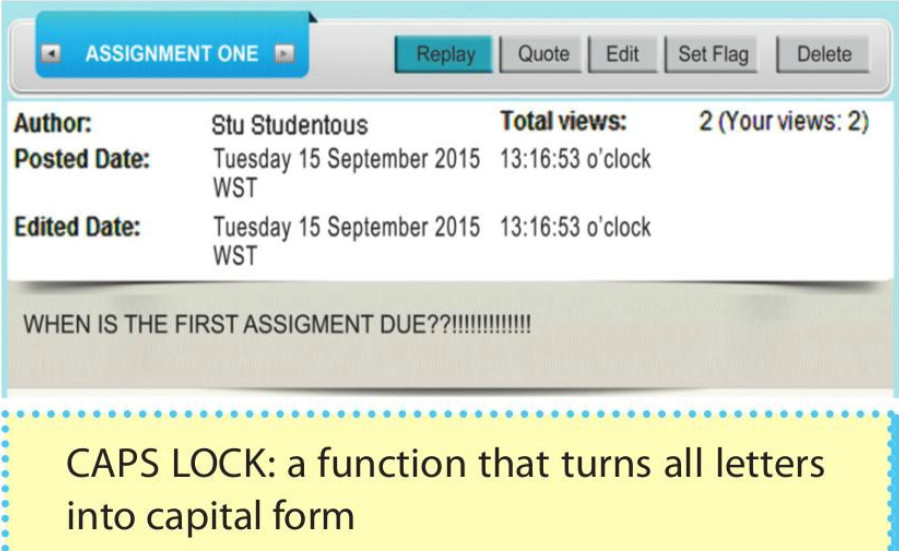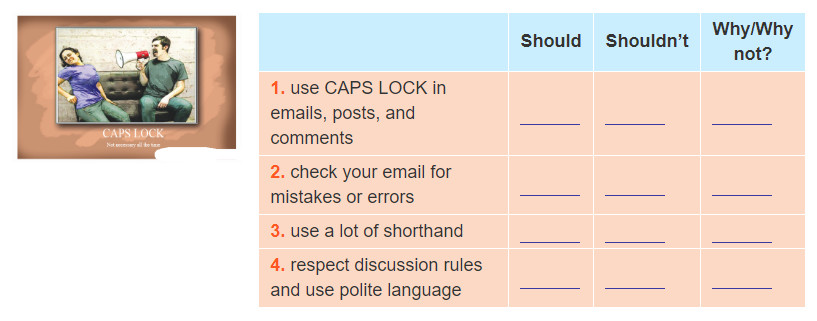Unit 10 lớp 8: Communication - Skills 2
Nhằm giúp các em luyện tập hai kĩ năng chính là Listening và Writing, phần Skills 2 - Unit 10 hướng dẫn các em nghe bài phỏng vấn về quy tắc hành xử trực tuyến đúng cách và làm các bài tập liên quan, sau đó yêu cầu các em viết một lá thư điện tử sử dụng quy tắc này. Mời các em tham khảo bài học dưới đây.
Mục lục nội dung

1. Listening
Netiquette (Quy tắc hành xử trực tuyến đúng cách)
1.1. Task 1 Unit 10 lớp 8
Look at the way this message is posted on an e-learning message board. Can you find any problems with it? (Nhìn vào cách mà tin nhắn này được đăng trên bảng tin nhắn học điện tử. Em có thể tìm thấy bất kỳ vấn đề nào trong đó không?)

Guide to answer
It use capital letters, "WHEN IS THE FIRST ASSIGNMENT DUE??!!!!!!!!!!". Writing in all capital letters is considered yelling online. It show the communication impoliteness.
(Nó sử dụng chữ in hoa, "KHI NÀO ĐẾN HẠN NỘP ĐẦU TIÊN ??!!!!!!!!!!". Viết bằng tất cả các chữ in hoa được coi là la hét trực tuyến. Nó cho thấy sự bất lịch sự trong giao tiếp.)
1.2. Task 2 Unit 10 lớp 8
Listen to this interview between a 4Teen magazine reporter and Dr Minh Vu about netiquette and answer the questions. (Nghe bài phỏng vấn này giữa biên tập viên 4Teen và Giáo sư Minh Vũ về phép tắc giao tiếp qua Internet và trả lời câu hỏi)
Click to listen
1. What’s ‘netiquette’? (Netiquette là gì?)
2. What is the main rule of netiquette?
(Quy luật chính của phép lịch sự giao tiếp trên mạng là gì?)
3. Besides the content of what we’re communicating, what else should we pay attention to?
(Bên cạnh nội dung mà chúng ta giao tiếp, chúng ta nên chú ý điều gì khác?)
Guide to answer
1. The word is a combination of “net” and “etiquette”. It’s a set of rules for behaving properly online.
(Từ mà là sự kết hợp giữa “net” và “equette”. Nó là một bộ quy tắc cho ứng xử trực tuyến phù hợp.)
2. Don’t say and do unpleasant things online, just like real life.
(Đừng nói và làm những điều không hài lòng lúc trực tuyến, chỉ như cuộc sống thật.)
3. It’s how we communicate with each other online.
(Nó là cách chúng ta giao tiếp với nhau trực tuyến.)
1.3. Task 3 Unit 10 lớp 8
Listen again to the interview an complete the following grid. (Nghe bài phỏng vấn và hoàn thành hệ thống sau.)
Click to listen

Guide to answer
.png)
Audio scripts:
Reporter: Dr Minh Vu, what exactly is ‘netiquette’?
Dr Minh Vu: The word is a combination of ‘net’ and ‘etiquette’. It’s a of rules for behaving properly online.
Reporter: Could you tell us the main rule of netiquette?
Dr Minh Vu: Remember that the people we’re communicating with online are real people. Don’t say and do unpleasant things online, just like in real life.
Reporter: But sometimes perhaps it’s not what we communicate, but how communicate...?
Dr Minh Vu: Absolutely. For example, if you write emails, or post comments using CAPS LOCK, this means you are shouting at people!
Reporter: Of course it’s not polite at all. What else should we do when sending emails?
Dr Minh Vu: Check your message for spelling mistakes before you send it. It shows respect towards the other person. Don't use too much shorthand. This may confuse your reader.
Reporter: How about behaviour in chat rooms and on message boards?
Dr Minh Vu: Follow discussion rules. Use polite language. People may not know who you are but you are judged by the quality of your writing.
Tạm dịch:
Phóng viên: Thưa tiến sĩ Minh Vũ, chính xác 'netiquette' là gì?
Tiến sĩ Minh Vũ: Từ này là sự kết hợp của ‘net’ và ‘iquette’. Đó là một quy tắc hành xử trực tuyến đúng cách.
Phóng viên: Ông có thể cho chúng tôi biết quy tắc chính của netiquette không?
Tiến sĩ Minh Vũ: Hãy nhớ rằng những người chúng ta giao tiếp trực tuyến là những người thực. Đừng nói và làm những điều gây khó chịu trực tuyến, hãy như là ngoài đời thật.
Phóng viên: Nhưng đôi khi có lẽ đó không phải là những gì chúng ta giao tiếp, mà là việc giao tiếp như thế nào ...?
Tiến sĩ Minh Vũ: Hoàn toàn chính xác. Ví dụ: nếu bạn viết email hoặc đăng nhận xét bằng cách sử dụng CAPS LOCK, điều này có nghĩa là bạn đang hét vào người ta!
Phóng viên: Tất nhiên nó không lịch sự chút nào. Chúng ta nên làm gì khác khi gửi email?
Tiến sĩ Minh Vũ: Kiểm tra tin nhắn của bạn để tìm lỗi chính tả trước khi gửi. Điều này thể hiện sự tôn trọng đối với người khác. Đừng sử dụng quá nhiều viết tắt. Điều này có thể khiến người đọc của bạn bối rối.
Phóng viên: Thế còn hành xử trong phòng trò chuyện và trên bảng tin thì sao ạ?
Tiến sĩ Minh Vũ: Thực hiện theo các quy tắc thảo luận. Sử dụng ngôn ngữ lịch sự. Mọi người có thể không biết bạn là ai nhưng bạn được đánh giá bởi chất lượng của văn bản của bạn.
1.4. Task 4 Unit 10 lớp 8
Look at the message in 1.1. Work with a partner to improve it with the netiquette you have learnt so far. (Nhìn vào tin nhắn trong phần 1.1. Làm việc với bạn bên cạnh để nâng cao nó với phép lịch sự trong giao tiếp trên mạng mà em đã học.)
Guide to answer
Dear teacher, (Thưa thầy /cô,)
Please let me know when the first assignment is due? (Vui lòng cho em biết khi nào đến hạn bài tập đầu tiên?)
Thank you. (Cảm ơn.)
Best regards, (Thân ái)
2. Writing
Writing an email using netiquette (Viết một lá thư điện tử sử dụng quy tắc hành xử trực tuyến đúng cách)
2.1. Task 5 Unit 10 lớp 8
Put the following parts in their correct place to make an email. (Đặt những phần sau vào đúng nơi để làm thành một thư điện tử.)

Guide to answer
1. c 2. f 3. e 4. b 5. a 6. d
Tạm dịch:
1. Bài nộp tiểu luận tuần 5
2. Thưa thầy/ cô,
3. Em tên là Vũ Minh Đức và em là học sinh lớp 8A của cô.
4. Vui lòng xem bài tiểu luận đính kèm của em cho tuần 5.
5. Cảm ơn cô rất nhiều.
6. Thân ái,
2.2. Task 6 Unit 10 lớp 8
Write a short email to your teacher to submit your group homework for this week. Check if you have used the netiquette learnt. (Viết thư điện tử ngắn cho giáo viên để nộp bài tập vể nhà nhóm cho tuần này. Kiểm tra liệu em đã dùng quy tắc hành xử trực tuyến đúng cách đã học)
Guide to answer
Group homework submission for this week
Dear teacher,
My name is Pham Ha Giang, and I am in group 4 from your class 8A.
Please find attached our group homework for this week.
Thank you very much.
Best regards,
Tạm dịch:
Nộp bài tập về nhà nhóm cho tuần này
Thưa cô,
Em tên là Phạm Hà Giang, và em là thành viên nhóm 4 trong lớp 8A của cô.
Vui lòng xem bài tập về nhà nhóm đính kèm của chúng em cho tuần này.
Cảm ơn cô rất nhiều.
Thân ái,
3. Practice Task 1
Choose the letter A, B, C or D to complete the sentences with given words
Question 1: I/ make/ friends/ foreigner/ in/ chat room.
A. I made friends with a foreigner in a chat room.
B. I am making friends with foreigner in a chat room.
C. I was made friends with a foreigner in a chat room.
D. I have made friends with foreigner in a chat room.
Question 2: Cultural differences/ can/ seen/ in/ conversation/ between/ people/ different countries.
A. Cultural differences can seen in conversation between people to different countries.
B. Cultural differences can seen in conversation between people on different countries.
C. Cultural differences can be seen in conversation between people from different countries.
D. Cultural differences can be seen in conversation between people for different countries.
Question 3: Learn/ English/ help/ us/ get over/ the/ language barriers
A. Learn English helps us get over the language barriers.
B. Learning English helps us get over the language barriers.
C. To Learn English helps us get over the language barriers.
D. Learnt English helps us get over the language barriers
Question 4: Have/ you/ ever/ attend/ video conference
A. Have you ever attended a video conference?
B. Have you ever attending a video conference?
C. Have you ever attend a video conference?
D. Have you ever attends a video conference?
Question 5: Thanks/ social networks, we/ can/ connect/ each other/ easily.
A. Thanks social networks, we can connect to each other easily.
B. Thanks social networks, we can to connect to each other easily.
C. Thanks to social networks, we can to connect to each other easily.
D. Thanks to social networks, we can connect to each other easily
4. Practice Task 2
Rearrange the sentences to make meaningful sentences
Question 6: My/ cellphone/ parents/ me/ buy/ promised/ a/ to/ I’m/ when/ 18.
A. My parents promised to buy me a cellphone when I’m 18.
B. My parents promised buy to me a cellphone when I’m 18.
C. My parents promised when to buy me a cellphone I’m 18.
D. My parents promised to buy a cellphone me when I’m 18.
Question 7: My/ landline/ to/ grandfather/ smart phones/ prefers.
A. My grandfather prefers to landlines smart phones.
B. My grandfather to prefers landlines smart phones.
C. My grandfather prefers landlines to smart phones.
D. My grandfather prefers smart landlines to phones.
Question 8: Non-verbal/ called/ languages/ are/ languages/ sometimes/ body.
A. Non-verbal languages are sometimes called body languages.<
B. Non-verbal languages are called sometimes body languages.
C. Non-verbal are languages sometimes called body languages.
D. Non-verbal are languages called sometimes body languages.
Question 9: If/ I/ someone/ send/ will/ her/ I/ a/ love/ send/ snail mail.
A. If I send someone, I will love her a snail mail.
B. If I send her, I will love someone a snail mail.
C. If I love her, I will send someone a snail mail.
D. If I love someone, I will send her a snail mail
Question 10: People/ have/ telepathy/ believe/ twins/ that/ often.
A. People have that twins often believe telepathy.
B. People believe that twins often have telepathy.
C. People twins believe that often have telepathy.
D. People believe twins often that have telepathy
5. Conclusion
Kết thúc bài học này, các em cần rèn luyện kĩ năng nghe bài phỏng vấn về quy tắc hành xử trực tuyến đúng cách và luyện viết một lá thư điện tử sử dụng quy tắc này; đồng thời ghi nhớ các từ vựng có trong bài học sau đây:
- netiquette: quy tắc hành xử trên mạng
- rule (n): điều luật
- shouting at : la hét vào
- polite (adj): lịch sự
- assignment (n): bài tập
- essay submission: xác nhận nộp bài luận
Tham khảo thêm
- doc Unit 10 lớp 8: Communication - Getting Started
- doc Unit 10 lớp 8: Communication - A Closer Look 1
- doc Unit 10 lớp 8: Communication - A Closer Look 2
- doc Unit 10 lớp 8: Communication - Communication
- doc Unit 10 lớp 8: Communication - Skills 1
- doc Unit 10 lớp 8: Communication - Looking Back
- doc Unit 10 lớp 8: Communication - Project
